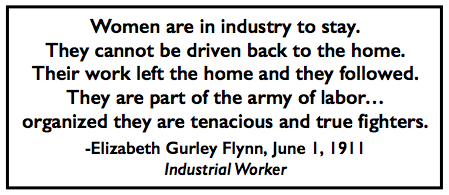 —————
—————
Hellraisers journal – Wednesday September 10, 1913
Profiles of Elizabeth Gurley Flynn, Inez Haynes Gillmore, and Caroline Lowe
From The Progressive Woman of September 1913:
—–
—–
 —————
—————
Hellraisers journal – Wednesday September 10, 1913
Profiles of Elizabeth Gurley Flynn, Inez Haynes Gillmore, and Caroline Lowe
From The Progressive Woman of September 1913:
—–
—–
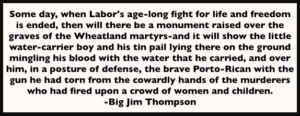 —————
—————
Hellraisers Journal – Sunday August 24, 1913
Marysville, California – Fellow Worker Blackie Ford Taken to Yuba County Jail
From The Marysville Appeal of August 23, 1913:
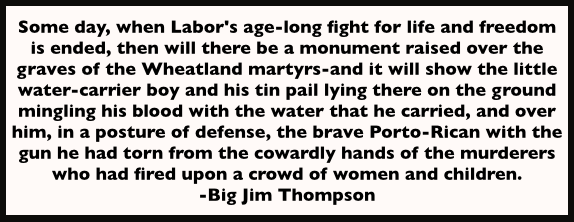 —————
—————
Hellraisers Journal – Saturday August 23, 1913
Marysville, California – I.W.W. Hop-Pickers Martyred at Wheatland
From the Industrial Workers of August 21, 1913:
 —————
—————
Hellraisers Journal – Sunday August 17, 1913
Duluth, Minnesota – Frank Little Kidnapped by Thugs, Rescued by Strikers
From Solidarity of August 16, 1913:
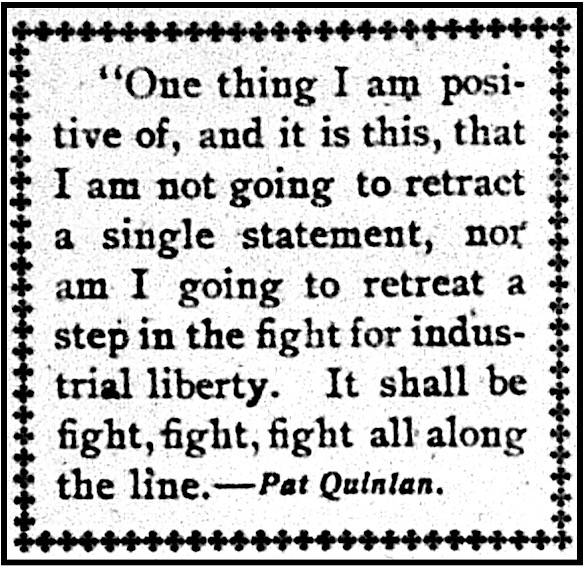
Hellraisers Journal – Thursday August 14, 1913
Pat Quinlan Released from New Jersey State Penitentiary but Soon Rearrested
From the Appeal to Reason of August 2, 1913:
—–
—–
From the Appeal to Reason of August 9, 1913:
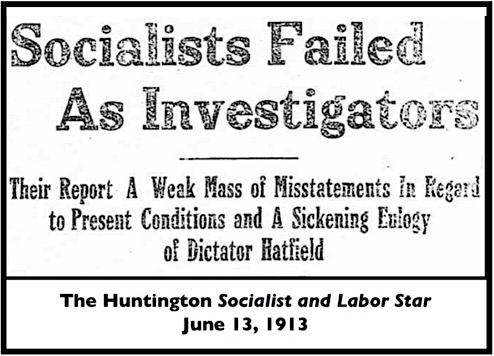 —————
—————
Hellraisers Journal – Tuesday August 12, 1913
Comrade Thompson Responds to Debs Regarding Socialists’ Report on West Virginia
From the International Socialist Review of August 1913:
A Reply to Debs
[-by W. H. Thompson
Editor of Huntington Socialist and Labor Star]
Editor of the Call:
In your issue of June 28 appears an article by Comrade Eugene V. Debs, headed “Debs Denounces Vilifiers of West Virginia Committee Report.” As one of the parties referred to as “vilifiers,” I would like to answer a few of the points made in the article.
The Socialist and Labor Star bitterly condemned the committee’s report; it did not publish it, but it did give an explanation for suppressing it, in the following words: “We have never, and will never, devote any of our space to whitewashing a cheap political tool of the capitalist class, not even when the whitewash is mixed by a committee representing our own party.”
From Comrade Debs’ own words I will endeavor to prove that our condemnation of the report was justified. Our charges against the report were that it was a “weak mass of misstatements and a sickening eulogy of Dictator Hatfield.” The truth of the last clause of the charge is plainly apparent to everyone who has read the report. The truth of the first clause is well known to all who have taken the trouble to inform themselves regarding the trouble in this state.
Comrade Debs says that when the committee arrived in West Virginia more than sixty of our comrades were in jail and two of our papers were suppressed. All true. Now pay particular attention to dates. The committee arrived in West Virginia on May 17. Hatfield was inaugurated governor on March 4, something over two months previous. These comrades had been held in-or put in-jail at Hatfield’s orders, and the papers had been suppressed at his command. Mother Jones, Editor Boswell, National Committeeman Brown, and forty-six other Socialists were placed on trial before a military drumhead court-martial on March 7. On March 9, the Circuit Court of Kanawha County issued a writ forbidding the trial of these prisoners by the militia. The sheriff went into the military zone to serve this writ, only to be met by the Provost Marshal, who, acting under orders from Hatfield, forcibly prevented the serving of the papers, and the drumhead trial proceeded in defiance of the civil courts.
The report of our committee says: “It was under the administration of Glasscock, and not Hatfield, that Mother Jones, C. H. Boswell and John Brown were court-martialed and convicted.”
On April 25, the Charleston Labor Argus was confiscated, suppressed, and those suspected of being connected with it were thrown into jail. On May 9 the Socialist and Labor Star was confiscated, its plant destroyed and five of its owners jailed by order of Governor Hatfield.
Our committee’s report referring to these outrages says: “In this connection it, is but fair to say that the governor and his friends disavow knowledge of these outrages!”
According to Comrade Debs’ article, it did not take him long to discover “that a certain element was hostile to the United Mine Workers.” Apparently, however, he failed to discover that there were numerous elements hostile to Socialism. There was an element hostile to the United Mine Workers’ officials who had just leagued themselves with Hatfield and agreed upon a “settlement” of the strike, which was odious to the strikers and which they have since totally repudiated. Comrade Debs uses this “element” that was hostile to the United Mine Workers as a shield to hide behind when we attack him for whitewashing Hatfield. Then he pours out this vial of wrath upon us:
The whole trouble is that some Chicago I. W. W .-ites, in spirit, at least, are seeking to disrupt and drive out the United Mine Workers to make room for the I. W. W . and its program of sabotage.
Speaking for myself, I will say that I have never seen a real live I. W. W.-ite. If there is or has ever been such an animal in West Virginia I am blissfully unaware of the fact. However, I have heard considerable of this new species from the capitalistic press and I note that the capitalists are very hostile toward it. I consider that a good recommendation for a labor organization and will certainly not speak slightingly of it or condemn it as long as the parasites fear it, but as for the I. W. W. being responsible for the attack on the Mine Workers’ officials, who deliberately attempted to betray the Kanawha strikers, I think Comrade Debs’ fear was father to the thought.
Then Debs dramatically points to Mother Jones and John Brown as evidence that the Mine Workers’ officials are straightforward and honest, or these two class-conscious comrades would not work for them. And I come right back with the assertion that both Mother Jones and Brown have worked, not for these officials whom he so vigorously defends, but for the rank and file of the workers.
 —————-
—————-
Hellraisers Journal – Monday August 11, 1913
Debs Denounces Critics of Socialist Party’s Report on West Virginia Situation
From the International Socialist Review of August 1913:
Debs Denounces Critics
From the N. Y. Call
Terre Haute, Ind., June 27.-The National Committee of the Socialist party in its regular session in May appointed a committee of three to investigate conditions in West Virginia. That committee, of which the writer was a member, was instructed to work in harmony with the United Mine Workers.
Having completed its investigation the committee has submitted its report, and it is in reference to this report, which has been widely published, that I now have something to say in answer to those who have assailed it.
First of all I want to say that I shall make no defense of the report. It does not need defense. It will answer for itself. But I do want to show the true animus of its critics and assailants, which they have been careful not to reveal in what they have written against it.
Two or three Socialist papers have bitterly condemned the report. Not one of them published it. Each of them suppressed it. They evidently did not want their readers to see it. It was sufficient for them to condemn it.
These Socialist papers have in this instance adopted the method of the capitalist papers with which I have had so much experience. A thousand times a speech of mine has been denounced by a capitalist paper while not a line of the speech was permitted to appear. That is precisely what these Socialist papers have done with our report, and if this is fair to themselves and their readers, I am willing to let it pass.
When our committee was appointed, more than sixty of our comrades were in the bullpen, martial law was in full force, two Socialist papers had been suppressed and there was a terrible state of affairs generally. Within four days after our committee arrived upon the ground every prisoner was released, martial law was practically declared off, the suppressed papers were given to understand that they could resume at their pleasure, and the governor of the state gave his unqualified assurance that free speech, free assemblage and the right to organize should prevail and that every other constitutional right should be respected so far as lay in his power.
[Here Debs neglects to say that when the two papers were “suppressed” equipment was destroyed, for which the papers were never compensated.]
It may be that our committee had nothing to do with bringing about these changes. As to this I have nothing to say. I simply state the facts.
Soon after our arrival it became evident that a certain element was hostile to the United Mine Workers and determined to thwart the efforts of that organization to organize the miners. This is the real source of opposition to our action and to our report.
Let me say frankly here that I do not hide behind the instruction of the National Committee that we work in harmony with the United Mine Workers. I would have done this under existing circumstances without instruction.
In our report to the party, we made a true transcript of the facts as we found them. We told the truth as we saw it.
And yet we have been charged by the element in question with having whitewashed Governor Hatfield and betrayed the party.
The truth is that we opposed Governor Hatfield where he was wrong and upheld him where he was right. But Hatfield is not the reason, but only the excuse in this instance. The intense prejudice prevailing against him has been taken advantage of to discredit our report as a means of striking a blow at the United Mine Workers.
[Here Debs ignores the hardships of Hatfield’s bullpen, where his comrades were held for several months, and the court martial they faced with possible death sentences hanging over their heads. All of which may have been a source of the “prejudice prevailing against him.”]
Had we, instead of doing plain justice to Governor Hatfield, as to everyone else, painted him black as a fiend, our report would have provoked the same bitter attack from the same source unless we had denounced the officials of the United Mine Workers, without exception, as crooks and grafters and in conspiracy to keep the miners in slavish subjection.
That would have satisfied those who are now so violently assailing us. Nothing less would.
For this reason and no other we are being vilified by sabotagers and anti-political actionists, and by those who are for just enough political action to mask their anarchism.
I am an industrial unionist, but not an industrial bummereyite, and those who are among the miners of West Virginia magnifying every petty complaint against the United Mine Workers and arousing suspicion against every one connected with it, are the real enemies of industrial unionism and of the working class.
[“Bummereyite” is an insult directed against the I. W. W., who are, at this time, facing prosecutions and long prison sentences in Ipswich, Paterson, and Little Falls, not to mention fellow workers who have lost their lives in those struggles.]
I am quite well aware that there are weak and crooked officials in the United Mine Workers, but to charge that they are all traitors without exception is outrageously false and slanderous.
The whole trouble is that some Chicago I. W. W.-ites, in spirit at least, are seeking to disrupt and drive out the United Mine Workers to make room for the I. W. W. and its program of sabotage and “strike at the ballot box with an ax.”
[This charge is simply not true. The I. W W. is engaged in its own struggles at this time and in no way attempted to destroy the U. M. W. A., only offering support to those oppressed under the rule of Hatfield’s pro-operator military dictatorship. Rather than listen to local leaders, on the ground in West Virginia, Debs makes a boogeyman of I. W. W., much like the capitalist press.]
 —————
—————
Hellraisers Journal – Sunday July 13, 1913
Paterson, New Jersey – Trial of Miss Flynn, Quinlan to Prison, Striker Murdered
From Solidarity of July 12, 1913:
From The Topeka State Journal of July 3, 1913:
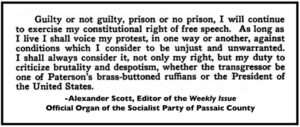 —————-
—————-
Hellraisers Journal – Thursday July 3, 1913
The Conviction of Alexander Scott, Editor of the Weekly Issue
From the International Socialist Review of July 1913:
The Conviction of Alexander Scott
A STATES Prison sentence of not more than fifteen years nor less than one year, with a fine of $250, was imposed, June 6th, on Alexander Scott, editor of the Weekly Issue, official organ of the Socialist party of Passaic County, who was convicted on June 3rd on a charge of “aiding and abetting hostilities to the government of the City of Paterson,” by Judge Klenert in the Court of Quarter Sessions.
No sooner was sentence announced when Henry Carless, a Socialist attorney of Newark, and Henry Marelli, both of whom defended Scott, filed notice that a writ of error had been applied for, a copy of which notice was presented to the judge. Bail of $3,000 was fixed and Scott was later released when Samuel Ginsburg, of Passaic, furnished the bond.
Scott was found guilty and sentenced under a law placed on the statute books in 1902 shortly after the assassination of President McKinley, but never before invoked in the State of New Jersey. Scott’s indictment was caused by the publication of editorials and pictures in the Issue in which the police, especially Chief Bimson, was characterized as the “boss anarchist” and the “boss strike-breaker.”
Scott’s conviction practically makes it a crime for any paper to criticize public officials, and makes the constitutional guarantee of free press a dead letter. In the prosecution of the case the state contended that the police were a part of the city government and that ridiculing the police was ridiculing the government.
“If we can’t criticize a policeman for his brutality, we might as well give up publication of newspapers in this country,” remarked a prominent newspaper man who was a visitor in court when sentence was imposed on Scott. He was highly indignant over the sentence, and said he would start a nation-wide movement to have the Scott verdict reversed.
That the authorities of Paterson have made up their minds to suppress the Issue was evidenced by the fact that they forced the sentence of Scott as soon as he was convicted. Though Patrick L. Quinlan, the silk strike leader, was convicted several weeks ago, the authorities made no move to sentence him, but they hurried the sentence of Scott.
While Scott’s case was rushed through, the authorities have made no move to prosecute the policemen who stole an edition of the Issue by breaking in the Socialist party headquarters and taking possession of 5,000 copies of the paper. The policemen are now out on $200 bail each, while Scott’s bail is fixed at $3,000.-N. Y. Call.
While the lawyers were arguing over technicalities, Scott, unconcerned, was busily engaged noting the proceedings in a notebook. “I am in the fight to win, and I am confident of exoneration in the higher courts,” said Scott. “They cannot suppress the Issue”
But the Socialists and Industrial unionists do not propose that Scott should serve one month in prison if they can help it. The S. P. of New Jersey, will appeal to the National Socialist Party to take up the Scott case and make a nation-wide fight in his behalf.
Solidarity, the I. W. W. organ has issued a call for protest meetings. “Scott has stood by the I. W. W. and the I. W. W. must stand by him,” writes Justus Ebert.

—————-
Hellraisers Journal – Wednesday July 2, 1913
“The Paterson Strike Pageant” by Phillips Russell, Part II
From the International Socialist Review of July 1913:
[Part II of II]
The New York Press the next day said:
“The Garden has held many shows and many audiences, from Dowie to Taft to Buffalo Bill, but it is doubtful if there ever was such an assemblage either as an audience or as a show as was gathered under the huge rafters last night. In fact, it was a mixed grouping that at times they converged and actor became auditor and auditor turned suddently into actor. When more than 10,000 sang and shouted within, 5,000 outside clamored for admittance and were willing to pay double the prices to get in.”
The New York Evening World said:
“Fifteen thousand specators applauded with shouts and tears the great Paterson Strike Pageant at Madison Square Garden. The big mill aglow with light in the dark hours of early winter morning, the shrieking whistles, the din of machinery-dying away to give place to the Marseillaise sung by a surging crowd of 1,200 operatives, the fierce battle with the police, the sombre funeral of the victim, the impassioned speech of the agitator, the sending away of the children, the great meeting of desperate hollow-eyed strikers-these scenes unrolled with a poignant realism that no man who saw them will ever forget.”
No spectacle enacted in New York has ever made such an impression. Not the most sanguine member of the committee which made the preparations for the pageant believed that its success would be quite so overwhelming. It is still the talk of New York, most cynical and hardened of cities, and will remain so for many days.
There were times when the committee were assailed with oppressive doubts. When one sat down and thought it over in cold blood, the idea of arranging for and carrying through such a thing in two weeks’ time seemed almost grotesque. Outside of the mechanical difficulties involved, the multitudinous details to be attended to, the advance outlay of money that would be necessary seemed to present an insuperable obstacle. There was the single item of $1,000 to be put down for the rental of one night, the $750 needed for scenery, the huge sum for advertising, all to be provided.
After plunging in with enthusiasm for the first few days, a bad reaction seized the promoters. They called a meeting in which the most gloomy forebodings were indulged in. There were disturbing reports of the small advance sale of tickets and there were serious proposals to give the whole thing up.
It was the workers themselves who stepped into the breach. Delegates from the New York silk strikers, whose cause has almost been lost sight of in the more spectacular struggle of Paterson, arose indignantly.
“What?” they cried. “Give this thing up after our people have set their hearts upon it? Never! Is it money you need? Leave it to us-we’ll raise that! We are poor. We are on strike. But a lot of us still have a few dollars left in the savings bank that we’ve been putting by through many years. We’ll get it out and lump it together. We will go to our business men and say: ‘Here, we’ve been trading with you a long time. We have helped to make your profits. Now you help us or we won’t trade with you any more.’ Never mind. You leave it to us-we will raise the money.”
And they did. Other generous people, more richly upholstered with ready cash, also came forward with contributions and in four days there was ample money with which to cover all deposits.
And it was found that the result was worth all the toil and trouble involved. The lives of most of us are sordid and grey. So tightly are we tied to the petty round of toil to which our galley-masters bind us, that most of us probably are born, live and die without experiencing one deep-springing, surging, devastating emotion. We are either afraid to feel or we have lost the capacity.
The Paterson pageant will be remembered for the sweeping emotions it shot through the atmosphere if for no other reason. Waves of almost painful emotion swept over that great audience as the summer wind converts a placid field of wheat into billowing waves. It was all real, living, and vital to them. There were veterans of many an industrial battle in that audience, though the cheeks of many still held the pink of youth.